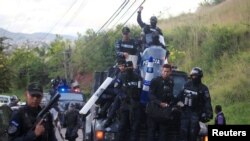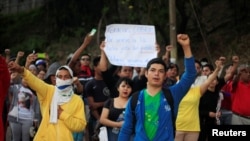Groups of police refused to enforce a government-ordered curfew designed to quell protests over a disputed vote count from Honduras' November 26 presidential election, as the country's political crisis deepened amid claims of fraud from President Juan Orlando Hernandez's main challenger.
Thousands of people left their homes overnight to show their support for the striking police, and televised images showed uniformed officers dancing with neighbors and chanting "JOH out!" in a reference to Hernandez's initials.
"We are tired of covering the backs of the political class to the detriment of the people," investigative officer Jose Garcia told reporters. "The police force is politicized, but it is not a robot. It is made up of human beings who think, feel and have rights."
But Security Minister Julian Pacheco said the police were not enforcing the curfew because they were exhausted from working long hours during the last three weeks around the election. He promised them a pay raise in January.
Hernandez held a narrow lead, according to official results from the Supreme Electoral Tribunal — results that opposition candidate Salvador Nasralla has claimed are fraudulent and is refusing to recognize.
'Crucial moments for democracy'
Nasralla applauded the disobedience of hundreds of officers who belong to the Cobra and Tigres special units across the country, saying these are "crucial moments for democracy in Honduras."
Hernandez called for "peace, common sense, fraternity and national unity," urging his compatriots to be patient as electoral authorities do their job.
The president held 43 percent of votes to Nasralla's 41.4 percent, according to the tribunal's website, with 99.98 percent of the vote count reported. The head of the tribunal has said that all ballots have been counted, but it has not declared a winner.
Both sides have claimed victory.
Tribunal president David Matamoros said the body was extending through Friday the period for candidates to file challenges.
"We want no doubt to remain," Matamoros said.
The long delay and lack of clarity in the count has angered Nasralla's supporters and fueled violent — and at times deadly — clashes between protesters and police in several cities. More than 1,200 people have been detained, and the Organization of American States said preliminary reports suggest as many as 11 may have been killed at or near protests.
"What we are demanding is for peace to be installed in Honduras, for the crisis to be resolved, and for there to be no more deaths or bloodshed," said Garcia, the policeman.
Nasralla supporters blocked the highway between the capital, Tegucigalpa, and the Caribbean coast in protest Tuesday. Transit police reported similar tie-ups in El Progreso and La Lima.
Curfew declared
On Friday, the government declared a 10-day curfew between 6 p.m. and 6 a.m. to try to calm the unrest, though on Monday that was scaled back from 8 p.m. to 5 a.m.
Political analyst Filadelfo Martinez said the curfew had succeeded somewhat in subduing the violence, but he urged politicians "to confront the situation better."
An OAS election observation mission said Monday night that an agreement between the main contenders was "the only path" to solving the conflict.
"The narrow margin of the results as well as the irregularities, errors and systemic problems that have surrounded this election do not allow the mission to have certainty about the results," mission chief and former Bolivian President Jorge Quiroga said at a news conference.
The OAS backed Nasralla's petition to verify 5,174 ballot boxes that were not reported the night of the election and 1,006 more whose votes were hand-counted because of apparent irregularities.
U.S. Senator Patrick Leahy, a Democrat from Vermont, issued a statement voicing "increasing alarm" over what he called "repeated delays and suspicious behavior — which suggests either incompetence or fraud" by the electoral tribunal.
"Honduras faces a defining moment in its modern history. How the government resolves this crisis will determine the path of the country for the foreseeable future. It will also determine the extent of validity and support the next government receives from the United States," Leahy said.










